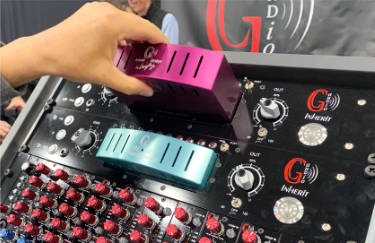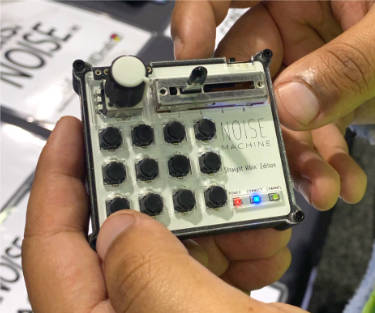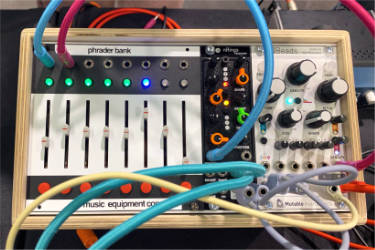Barry Wood's NAMM Oddities 2022 Edition

Techno Geek Toys
The Knob Dance
Because it would be impractical to wish for 36 hands, the Nina synthesizer from Melbourne Industries uses nifty motorized knobs, which makes for some interesting morphing possibilities when recalling patches.
- Melbourne Instruments
- www.melbourneinstruments.com
For Those About to Cut
Anyone sending audio out for vinyl cutting should have the Perfect Groove software. It models what the cutting lathe is going to do and flags issues before you touch lacquer. Plus the results look like a DNA sequence, which provides a serious and scientific air to impress clients.
- Rebeat Innovation GmbH
- www.perfectgroove.com
Atari VCS Inspired Mic Preamp
You can hot swap the core circuitry in this unique mic preamp system. They currently have one tube cartridge and five different solid state carts fashioned (and obliquely named) after consoles you have most certainly heard of. Blowing into the preamp cartridge, however nostalgic, is not advised.
- GC Audio
- www.gc-audio.com
The Loop Sequencer for Visual Learners
If you want to keep track of your groove with your eyes as well as your ears, look no further (literally). The Orbita gives you a visual and tactile interface with no ambiguities.
- Playtronica
- www.playtronica.com
Books, Covers, Judging
This unassuming little device has far more going on under its machined aluminum hood than you might think. It's a multi-input mixer with built-in effects that will output 2-, 4-, or 8-channel sound and can be battery or USB powered. Oh, it's also got a short-range FM transmitter built in.
- Audio Instruments Corp
- www.audioinstruments.com
Do You Believe in LFOs?
I do, as many as possible, and I love the idea of being able to set up and route them to multiple devices.
- Three Degrees Audio
- www.3degreesaudio.com
Touchscreen Keytar
I like the MPE implementation on this instrument, but I suspect it would take a substantial amount of practice to be able to perform live without hitting lots of wrong notes. Moreso if you're prone to sweating.
- Netherblade
- www.netherblade.com
Two Birds With One Stone
At least where the birds are MIDI CC values and the stone is your foot. This pedal is capable of generating sustain and expression CC MIDI data. I could see this being quite useful for the orchestral mockup crowd.
- Black BT
- www.black-bt.com
Chord Morphing
The Fluid Chords software lets you program multiple chords and then trigger them. Using an MPE virtual instrument, the notes will pitch bend from one to another independently.
- Pitch Innovations
- www.pitchinnovations.com
The Littlest Controller
This diminutive critter is a Bluetooth MIDI Controller. It's got twelve buttons, a slider and a CC knob. That's a fair amount of power in something you could conceivably lose between couch cushions.
- this.is.NOISE
- www.thisisnoiseinc.com
Faders With Memory
Each fader on this Eurorack module has memory so you can program moves and have it one-shot or loop, sending control voltages to where you have them patched.
- Madrone Music
- www.madronemusic.com
Enner If You Dare
The Enner lies in the intersection between art piece and musical instrument. It's a five voice synthesizer that you "patch" by making physical contact between the metallic pads. I wish I could have heard it better but… NAMM.
- SOMA Laboratory
- www.somasynths.com
Tower of Power
This big spring reverb sounded lovely. It also has the advantage of fitting nicely into a corner of the room. Another plus? It's kind of a plinth, and how many studios can boast a plinth?
- Days of Yore
- daysofyoreaudio.com
MIDI Nerve Center
If you've got a mix of computers, controllers, sequencers, synthesizers, or any other MIDI-equipped doodad, this device will allow you to route, filter, and synchronize to your heart's content.
- Conductive Labs LLC
- www.conductivelabs.com
Much More Than a Light Organ
This proof-of-concept product analyzes the content of audio, and using various parameters, re-encodes the audio to include inaudible control signals that can utilized later. The advantage here during a performance you're just playing audio and their software detects the signals for routing to control lighting or whatever else. Anyone who has had to do timecode synchronization will appreciate this simplicity.
- Synchronized Impulse Design
- www.syncimpulse.com
Arbitrary Deployment
This clever bit of kit lets you string up the lights however you like and then use the camera on your phone to map each light's physical position. You can then display patterns and graphics across the whole rig.
- Twinkly For Business
- pro.twinkly.com
Photon-Triggered Chaos
Kassia's Liquidrone Red Edition is a three-oscillator drone machine controlled by photoresistors. "Control" might be a bit of an overstatement as it has a tendency to do what it wants.
- Screwed Circuitz
- www.screwedcircuitz.com
Cylinder of Silence
This video accurately reflects how impressively well the Acoustiblock material works in person. The only problem would be resisting the urge to carry it with me constantly and drop it over certain annoying people.
- Acoustiblok
- www.acoustiblok.com
Prison-ears
It looks to me as if the binaural ears in the Auras USB microphone are flight risks.
- Melody
- www.melodytechinc.com
Visual Sidechain Filtering
The Sidechain.One is really just a high quality compressor with a sidechain filter, but the cool twist is using faders instead of knobs for setting the high and low frequencies.
- Rockruepel
- www.rockruepel.com
PPG-again
The 3rd Wave by Groove Synthesis might look like a PPG Wave clone, but it's really what the Wave might have been had development continued.
- Groove Synthesis
- www.groovesynthesis.com
Sketchy
Much like automation lanes for MIDI tracks in a DAW, the Whirled app lets you add MIDI notes and controller data. While you can do this with a mouse or knobs, the touch screen makes it much faster and more intuitive. Personally I'm interested in using it synced and routed to my DAW so I can use any virtual instrument that I like.
- whirlednotes
- www.whirlednotes.com
Pseudo Organic
Imagine, acoustic panels and diffusers that look like real building materials, not like you just got creative with a staple gun and the packing material from your last Amazon delivery.
- Audimute
- www.audimute.com
©2022 Barry Wood















